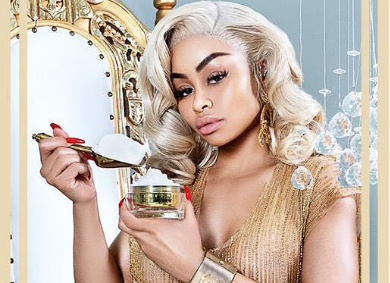How Blac Chyna is reinforcing colorism in West Africa

In late November, reality TV star Blac Chyna launched a new luxury skin lightening product in collaboration with Whitenicious by Dencia. Though both Chyna and her collaborator are based in Los Angeles, the product was launched in Lagos, Nigeria. That an American celebrity considered it lucrative to not only market a skin lightening brand abroad, but also travel all the way to Nigeria to promote it, says a lot about the socio-economic influence skin lightening products have in West Africa.
According to AJ+, the skin lightening industry is worth more than $20 billion. Over 77 percent of Nigerian women in particular use skin lightening products. Some African countries, including Nigeria, have passed legislation that prohibits the sale of skin bleaching creams with the harmful chemical hydroquinone, but such laws do little to prevent citizens from bleaching their skin using other products because they don’t actually address why people use them. Of course, the health implications of using these products matter — and banning dangerous chemicals like hydroquinone is important. But focusing only on the health implications of skin lightening products doesn’t address how users of them have been indoctrinated by colorism, a mindset in turn enforced by Eurocentric standards of beauty.
While all black people experience racial discrimination, the intensity of discrimination, its frequency, and the outcomes of it differ dramatically based on a black person’s skin tone. This is known as “colorism,” or the ways in which people of color with light complexions are unfairly granted social and political access and privilege, while people of color with darker skin are denied such opportunities. In perhaps the starkest act of colorism, the Coloured Labour Preference Policy provided light-colored South Africans legal advantages over darker ones in relation to employment, free movement, accumulation of property and wealth, etc. While such blatant discriminatory legislation has been abolished, its legacy is evident in our culture. For example, when brands cast people of color in ads for their products, they tend to opt for lighter people of color, as do those who cast lead roles in TV shows, movies, and videos.
Colorism is also intertwined with sexism. As Florida A&M University psychology professor Huberta Jackson-Lowman argues, Eurocentric standards of beauty reflect racism as well as the operation of patriarchal domination over women, in that men run the industries that largely determine what is “beautiful” and women are rewarded or punished based on these standards. Take Toke Makinwa, a Nigerian media personality and author, who spoke openly about having lightened her skin in her book On Becoming. She has maintained lightening for years, she says, because she began to get more financial opportunities in the media industry once she did.
Of course, colorism is also frequently unconsciously perpetuated by people due to decades of systematic conditioning and socialization. But companies that blatantly capitalize on colorism and self-hate, like skin bleaching companies, inarguably do so intentionally. While the news of Blac Chyna’s product launch received a lot of criticism on social media platforms — it made the headlines on sites like OkayAfrica, which highlighted the disturbing nature of her advocacy for skin lightening products — the founder of the partner company, Dencia, took to Twitter to bash people who were calling her out for these products.
Yet there is also evidence that the widespread colorist narrative is slowly beginning to change thanks in large part to social media activism. Pages like @darkskinwomen and @Darkskinmen promote body positivity among dark-skin people to hundreds of thousands of followers. African Influencers like Khoudia Diop, Tiwa Savage, and Duckie Thot serve as role models to young Africans who rarely see successful dark-skinned models and celebrities. Other campaigns, like the Unfair And Lovely campaign, also have raised awareness about skin tone-based discrimination by educating people about the often unconscious colonial mindset of “whiter” being beautiful, rather than shaming or bullying people who bleach their skin.
Ultimately, more representations of darker-skinned people of color in the media will be essential to breaking this discriminatory narrative of colorism. But until then, we need to change our perceptions of beauty by giving people of all skin shades equal opportunities.
More articles by Category: Body image and body standards, Race/Ethnicity
More articles by Tag: Africa, Black, Racism, Social media, Women of color


























